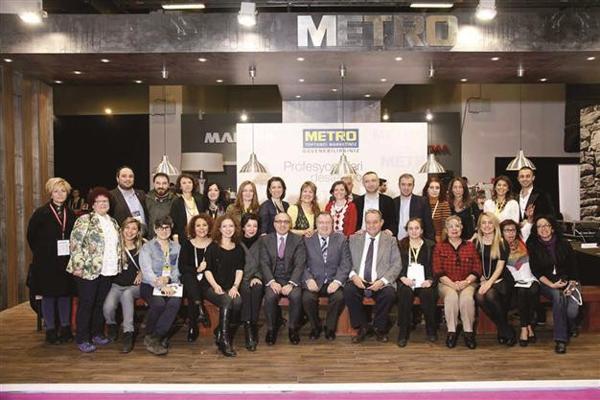Behind the Veil
AYLİN ÖNEY TAN - aylinoneytan@yahoo.com


wine and spirit section was ridiculously small, placed in an awkward corner, and tightly veiled behind heavy curtains hidden from visitor’s eyes. Officials and bodyguards strictly guarded all access to the spirit section, practically keeping that section off the limits.
The new law prohibiting the promotion of alcoholic drinks was the reason for this “covering” of the spirit corner, but it was the hyper control at the entrance that irritated most visitors. On the first day, the angry employee safeguarding the drinks section denied entrance to most journalists, and there were hot debates on who could access the closed cabin-like section. First of all, one needs to mention that the Sirha event was open to professionals only, and all visitors were from the hospitality and food service sector. The students of gastronomy schools were strictly kept away from the “evil” section; the logic behind this has yet to be explained, but it should be remembered that these university students are the future of gastronomy in Turkey.
Sirha is the world’s foremost hospitality and food service event and is held every two years in Lyon in France. The 2003 figures for the Lyon event were impressive, as 2,980 exhibitors and brands were presented, with 18,715 chefs attending from 138 countries. If Turkey wants to be in the same field and have its own Sirha events in the future, there has to be solution to such ridiculously over-protective measures. The new law is bringing enough strain to both producers and consumers, but such harsh implementations in professional venues are not at all understandable.
Just a few steps further from Sirha, at the Hilton Bosphorus Hotel, there was the annual meeting of tourism professionals. The presentation of Kaya Demirer, the president of TURYİD, the association of tourism restaurant investors and operators, focused on the importance of gastronomy as the rising trend in tourism. His talk was motivating and hopeful, but our renowned chef Mehmet Gürs was skeptical; he kept asking, if we try to keep wines out of sight in such an important international event aimed at professionals, what kind of gastronomy tourism are we talking about? That is one big question indeed, especially problematic when one considers the future of the thriving boutique wineries in Anatolia. After the first day, the only French wine group left the exhibition ground protesting the attitude, and there was only one daring Turkish company, Suvla, exhibiting their wines and organic food line, unfortunately also veiled together with the wines. It was ironic that another French company was openly displaying mock Champagne and fancy fake wine bottles, but of course with contents without alcohol.
The bright side of Sirha was this year there was emphasis on local products, thanks to Metro Cash & Carry stores and MDD Turkish Friends of the Kitchen Association. Many artisanal Anatolian tastes in danger of extinction were put on the table. The press breakfast was lavishly laden with local chesses, butters, jams, molasses, and honey, even with special artisanal breads. Metro wholesale market gives support to local producers and develops projects to safeguard products that have geographical indication label. They have been working with Professor Yavuz Tekelioğlu for years now, an academic who has practically devoted his life to promoting the virtues of geographical indication and appellation systems. It was kind of heartbreaking that the system is not yet fully understood and implemented in Turkey, but the projects by the Metro group raise hopes for the future. Their magazine Gastro, created by editor Nilhan Aras, is now celebrating its 75th edition, with each issue devoted to bringing out the virtues and products of Anatolian cuisine. One cannot help but gasp with emotion when viewing the video showing the producers, tears welling up in the eyes, when the lady keeping her father’s orange grove alive with Metro’s support says that Eden is where the orange tree is.
Sirha is a big gastronomic event; we have to seek ways of keeping it in Istanbul, making it ours by placing emphasis on uniquely local products and producers. Needless to say, we also need to find a way to avoid these overly oppressive implementations like veiling the products we should be proud of. The future will not be bright behind dark curtains.
Bite of the week
Fork of the Week: The omnivore event was a great opportunity to bring together chefs so that they could cook together and find common ground. Organized by The Hybrid, the founder, Gözde Yolaç Savaş, is one name to follow for future events. It was nice to see Maksut Aşkar among the diners in his new locale, NeoLokal, handing the kitchen over to Kemal Demirasal of Alancha in Alaçatı and to Davy Schellemans of Veranda in Antwerp as guest chefs. Everything we tasted was exquisite; I think I want an omnivore event every now and then.
Cork of the Week: A big applause goes to Suvla, the only Turkish wine company who dared to hire a corner at Sirha. Despite being hidden behind curtains, their courage was notable, and the lovely couple Pınar and Zafer Ellialtı was very hospitable to their guests, proving that Sirha was a hospitality event. Though I did not have the appetite to taste their wine under such circumstances, the delicious Suvla Sır 2011 was perfect with the slow-cooked lamb at the omnivore pop-up dinner.

